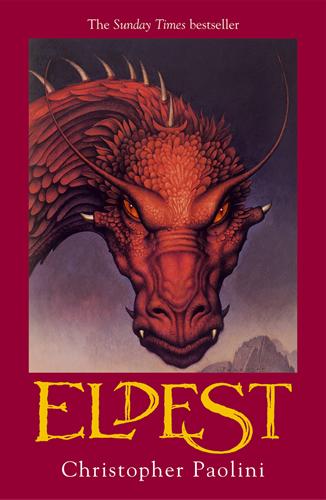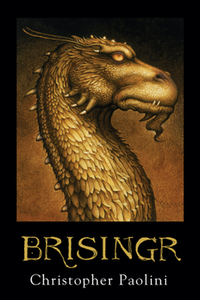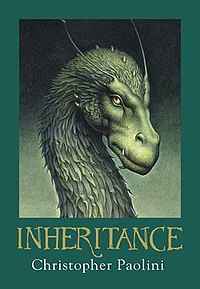"Knowing is independent of being. I did not know you existed before you bumbled in here and ruined my nap. Yet that doesn't mean you weren't real before you woke me." - Solembum
Inheritance Cycle by Christopher Paolini. This series, previously meant to be a trilogy, is an epic fantasy series intended for young adults. Eragon has no idea of who his mother or father are, instead he lives with his uncle, Garrow, and cousin, Roran, which to him they are his father and brother. Eragon helps in the farm as well as with the hunting. One day while hunting he finds a mysterious stone, no one knows what it is but it is fascinating. To his surprise the 'stone' hatches, it was a dragon's egg. Eragon has to flee, learn magic and mature if he is to fulfil his destiny, to become the next dragon rider and kill Galbatorix; the merciless and powerful dictator of the fictional world of Alagaesia.
Like many books the Inheritance cycle ponders on the coexistence of good and bad. Eragon himself realises that people might not be generally bad but really do believe their ideas to be beneficial. When Galbatorix talked to Nasuada about his plans there seemed to be some really good basis to what he wanted to achieve. Of course Galbatorix didn't care for people and manipulated them making him the 'baddy' however he made very good points, especially the fact that it was the Varden that went around killing people and then bashed Galbatorix for his cruelty. How do we know if what we believe in is really for the good of humanity? I may believe in something so profoundly that I do not realise that I'm hurting others or it may be that I am hurting others to help the many but in truth there is no line separating the good from the bad but a mix of both in everything.
 "It's huge", "It's a dictionary","Way too long"- Since reading this series it seems that those phrases are the first things that anyone says when they see the book. The books are humongous, this can be attributed to the thick pages, large writing, index and glossary but I can not pretend this is not an extensive book. The books did become more widely known after the movie however the length of the books really do discourage readers. I have no problem with reading longer texts but that is not to say that it doesn't take me longer to pick up those books from the shelves than other shorter novel. The actual story was interesting enough that I got through each book in a couple of days. Sometimes the story got a bit lengthy. It was way too detailed, the art of making swords or of the battle may be of interest but I don't need to know every detail about it especially since I don't even understand the technical terms. I really think they could have skipped a few paragraphs, that's what I did when I was writing and it didn't make the book less descriptive. As I got to the end of the last books I could definitely see they were rushing the story. Actually, I think that the best thing for the book would be if it were made into a longer series, with 6 books, that way the story would be the same length but the size wouldn't be discouraging.
"It's huge", "It's a dictionary","Way too long"- Since reading this series it seems that those phrases are the first things that anyone says when they see the book. The books are humongous, this can be attributed to the thick pages, large writing, index and glossary but I can not pretend this is not an extensive book. The books did become more widely known after the movie however the length of the books really do discourage readers. I have no problem with reading longer texts but that is not to say that it doesn't take me longer to pick up those books from the shelves than other shorter novel. The actual story was interesting enough that I got through each book in a couple of days. Sometimes the story got a bit lengthy. It was way too detailed, the art of making swords or of the battle may be of interest but I don't need to know every detail about it especially since I don't even understand the technical terms. I really think they could have skipped a few paragraphs, that's what I did when I was writing and it didn't make the book less descriptive. As I got to the end of the last books I could definitely see they were rushing the story. Actually, I think that the best thing for the book would be if it were made into a longer series, with 6 books, that way the story would be the same length but the size wouldn't be discouraging. Now to the actual plot. I found the story a bit too gruesome from what I am accustomed to but it was still very captivating. The books and movie received quite a lot of critique because of its similarity to Star Wars and Lord of the Rings, but I ask, what other books in our modern society aren't copied of somewhere else? Even the most original of stories have a basis on some old, forgotten classic. This really wasn't a problem for me. Although the ending was obvious that Eragon was going to live and defeat Galbatorix, there were quite a few surprises throughout the books that kept me very interested. The fact that the reader had no idea of Eragon's background, nor did Eragon even known this himself really allowed the story to give out information in pieces so that we would read to the end to have the whole puzzle.
Now to the actual plot. I found the story a bit too gruesome from what I am accustomed to but it was still very captivating. The books and movie received quite a lot of critique because of its similarity to Star Wars and Lord of the Rings, but I ask, what other books in our modern society aren't copied of somewhere else? Even the most original of stories have a basis on some old, forgotten classic. This really wasn't a problem for me. Although the ending was obvious that Eragon was going to live and defeat Galbatorix, there were quite a few surprises throughout the books that kept me very interested. The fact that the reader had no idea of Eragon's background, nor did Eragon even known this himself really allowed the story to give out information in pieces so that we would read to the end to have the whole puzzle. Another issue that I came across in the book was that of courage is fighting for something even though you knew you would lose from the beginning. This idea was something that I had read on To Kill a Mockingbird but never truly understood. Until I read Inheritance it seemed to me that this idea of courage was more of someone who didn't want to admit defeat or something that would just be wasting time however since reading Inheritance I understand this as being real courage, and right difficult too. The power of the people is great and Galbatorix only gained power through the people (the start of his rise came from his own power but he needed the support from others, not only those who he manipulated.) and it was because each individual didn't have the courage to fight for something they knew they would lose but if each one of those individuals grouped like the Varden then maybe they wouldn't lose, it would be the power of the people. Singular they may have lost and seen no point to fight, but if they had 'courage' they would lose and yet slow down Galbatorix until all the individuals who lost would turn out to be a group of people who might just have a chance at winning.
Another issue that I came across in the book was that of courage is fighting for something even though you knew you would lose from the beginning. This idea was something that I had read on To Kill a Mockingbird but never truly understood. Until I read Inheritance it seemed to me that this idea of courage was more of someone who didn't want to admit defeat or something that would just be wasting time however since reading Inheritance I understand this as being real courage, and right difficult too. The power of the people is great and Galbatorix only gained power through the people (the start of his rise came from his own power but he needed the support from others, not only those who he manipulated.) and it was because each individual didn't have the courage to fight for something they knew they would lose but if each one of those individuals grouped like the Varden then maybe they wouldn't lose, it would be the power of the people. Singular they may have lost and seen no point to fight, but if they had 'courage' they would lose and yet slow down Galbatorix until all the individuals who lost would turn out to be a group of people who might just have a chance at winning.
I'm sorry for this blog post being so long, I guess I just got into the feeling of the long Inheritance cycle. The book may have been 'copied' of other famous fantasies but there is so much depth to it that I could go on forever. To sum it up what I really wanted to say is "THIS BOOK MAY BE A DICTIONARY BUT ITS WORTH READING IT."
I'm sorry to disagree but these books are not worth reading.
ReplyDeleteIn response to the idea that their is nothing new in society holds no grounds as an argument. The problem is that he doesn't do anything new with the elements. What's left is an unimpressive. By the time he does it isn't much of a story. There's no new reason that this story needs to be told again for the thousand time.
The length of each book is indeed a problem as nothing gets resolved fast. Nothing happens in Eldest or Brisignr to validate it's length. The fact is contributed by godawful purple prose.
Everyone has a different opinion, I'm sorry that you didn't enjoy it. Although I do not fully agree with the idea he didn't make something a bit new with the elements I thought that was a really good argument that stimulated my thinking and I fully respect where you are coming from.
ReplyDeleteThank you so much for commenting, it is really nice to know when people are reading this blog and I love knowing other people's ideas especially one's like yours that make me think more about the plot and my own thoughts on the book.
PS: If this book wasn't good, which book do you think is a good one for me to read?